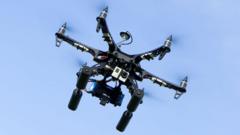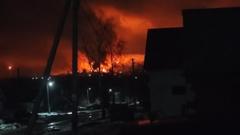Germany's cabinet has decided to allow the military to shoot down suspicious drones near sensitive installations as concerns grow over aerial security threats, especially in light of the ongoing conflict involving Russia and Ukraine.
Germany Authorizes Military to Shoot Down Suspicious Drones Near Key Installations

Germany Authorizes Military to Shoot Down Suspicious Drones Near Key Installations
Germany's new measure comes amid increasing drone activity near military and critical infrastructure sites.
Recent advancements in drone technology have prompted the German government to take significant measures to protect military sites and critical infrastructure. Interior Minister Nancy Faeser announced that due to the increasing frequency of unauthorized drone activities—exacerbated by Russian aggression and espionage concerns—military personnel will now have the authority to shoot down drones that pose a potential threat.
Faeser noted that since the onset of the conflict in Ukraine, drones have emerged as a significant challenge for law enforcement. Allegations have been made about Russia's involvement in a shadow war targeting Western nations that support Ukraine. Polish Prime Minister Donald Tusk echoed these concerns, mentioning acts of potential air terror planned by Russia that could affect airlines worldwide.
The apprehension surrounding drone activities has culminated in the sighting of at least 10 drones over the Manching Air Base in Germany, as well as instances near the US Air Base at Ramstein and other sites. Under existing regulations, the German Army's role was limited to assisting police in directing drones away or landing them and firing warning shots when necessary. However, these new proposals, pending parliamentary approval, would empower soldiers to take direct action against drones that endanger people or critical installations.
Adding to the situation, investigations by Polish authorities indicate that drone-related incidents may be part of a broader strategy by Russian intelligence agencies to undermine Western air travel and infrastructure. While Russia has denied involvement in such activities, recent events reflect ongoing tensions and escalations in security measures across Europe.
As Europe continues to grapple with these security challenges, the authorization to shoot down drones represents a significant shift in military engagement protocols aimed at safeguarding vital assets and the safety of civilians.
Faeser noted that since the onset of the conflict in Ukraine, drones have emerged as a significant challenge for law enforcement. Allegations have been made about Russia's involvement in a shadow war targeting Western nations that support Ukraine. Polish Prime Minister Donald Tusk echoed these concerns, mentioning acts of potential air terror planned by Russia that could affect airlines worldwide.
The apprehension surrounding drone activities has culminated in the sighting of at least 10 drones over the Manching Air Base in Germany, as well as instances near the US Air Base at Ramstein and other sites. Under existing regulations, the German Army's role was limited to assisting police in directing drones away or landing them and firing warning shots when necessary. However, these new proposals, pending parliamentary approval, would empower soldiers to take direct action against drones that endanger people or critical installations.
Adding to the situation, investigations by Polish authorities indicate that drone-related incidents may be part of a broader strategy by Russian intelligence agencies to undermine Western air travel and infrastructure. While Russia has denied involvement in such activities, recent events reflect ongoing tensions and escalations in security measures across Europe.
As Europe continues to grapple with these security challenges, the authorization to shoot down drones represents a significant shift in military engagement protocols aimed at safeguarding vital assets and the safety of civilians.






















